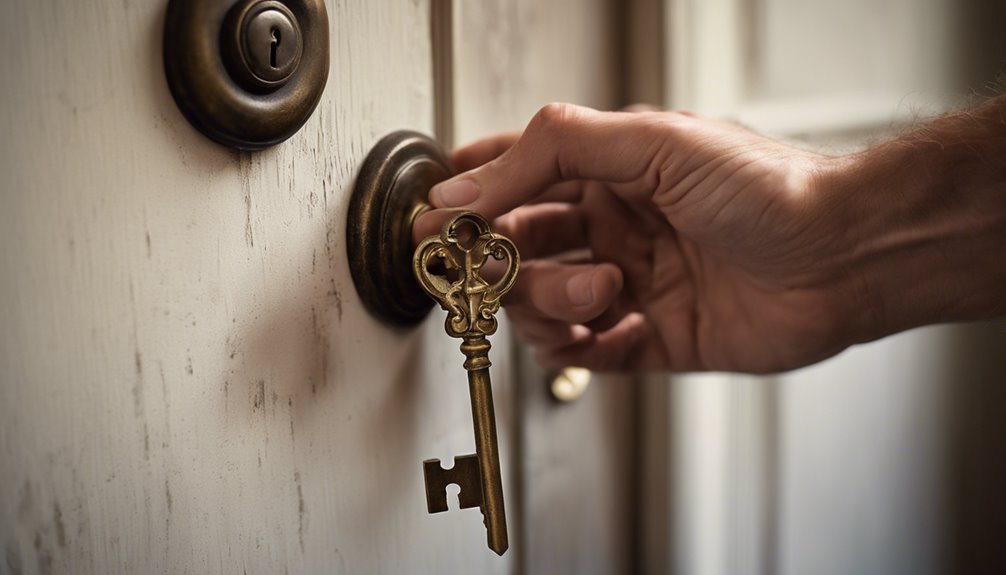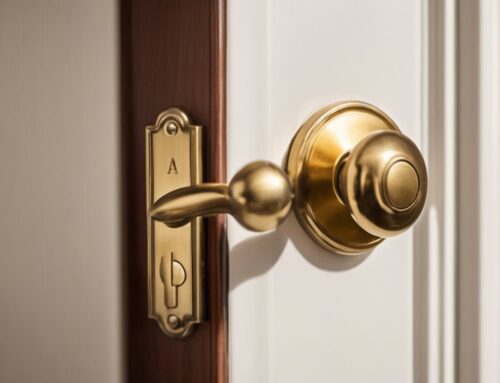If you're a landlord or a tenant in Illinois, understanding the state's rekeying laws is essential for ensuring both security and compliance. You may think that simply having a functioning lock is enough, but the nuances of these laws can put you at risk for potential liabilities. Are you aware of the exemptions that apply, or what steps you should take if you feel unsafe in your rental? Knowing these details can greatly impact your peace of mind and legal standing, so let's explore the ins and outs together.
Key Takeaways
- Landlords must rekey units before new tenants move in to comply with Illinois regulations and prevent legal liabilities.
- Exemptions apply for properties with fewer than four units, owner-occupied buildings, and specific tenant lease agreements.
- Non-compliance with rekeying laws can lead to civil penalties, lawsuits, and damage to landlord-tenant relationships.
- Utilizing licensed locksmiths ensures compliance while providing cost-effective and efficient rekeying services for landlords.
- Lease agreements should clearly outline rekeying clauses, tenant rights, and mandatory safety disclosures to promote transparency and legal compliance.
Requirements for Rekeying
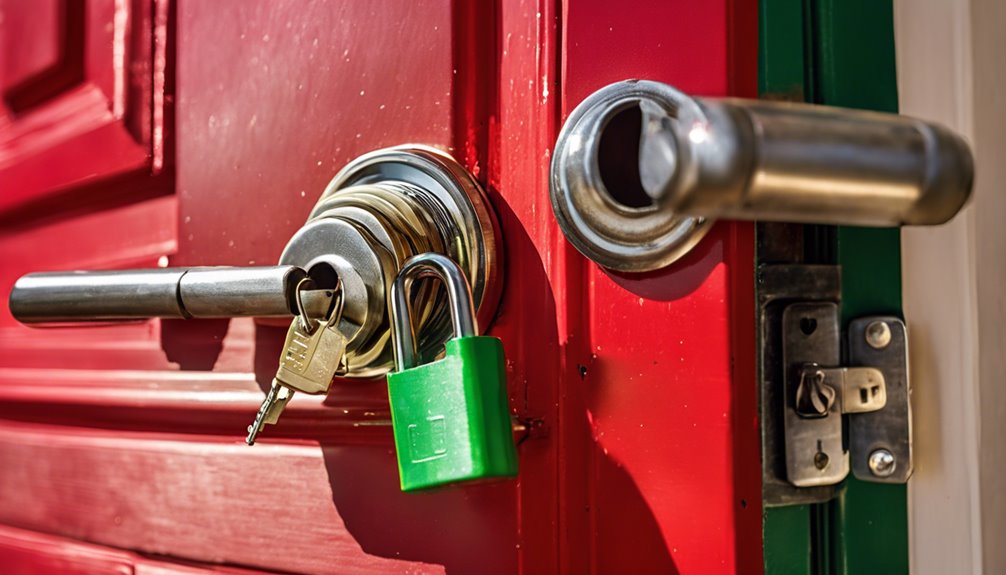
Rekeying a dwelling unit in Illinois entails specific requirements aimed at ensuring security for new tenants. After a tenant vacates, landlords must rekey the unit on or before the new lessee takes possession. This process must be completed prior to the new tenant moving in, thereby safeguarding their security. Additionally, landlords must comply with these regulations to avoid potential legal issues. The regulation of locksmith activities in Illinois helps to ensure that proper protocols are adhered to when rekeying to prevent fraud and abuse.
Importantly, these requirements apply strictly to leases or rental arrangements executed after the effective date of the amendatory Act of the 95th General Assembly.
Landlords bear the obligation to change or rekey locks providing immediate access to the individual dwelling unit. Definitions of rekeying include entirely replacing the lock, changing the lock cylinder, modifying combinations on combination locks, or altering electronic locks. Security deposits must be returned within specified time frames based on damage reports, ensuring that landlords address any final concerns before the new tenant occupies the unit.
Fundamentally, any adjustment that changes the access method from that of the former tenant fulfills this requirement.
However, there are exemptions; properties with fewer than four units may bypass these regulations. If the renter rekeys the unit themselves, as stipulated in a written lease, this also qualifies for exemption.
Additionally, owners residing in another unit within the same building aren't subject to rekeying mandates, nor are units in counties with populations exceeding three million where specific amendments may apply.
This structure within the Illinois Landlord and Tenant Act, specifically Section 15, affirms that ensuring secure access is paramount.
Penalties for Non-Compliance
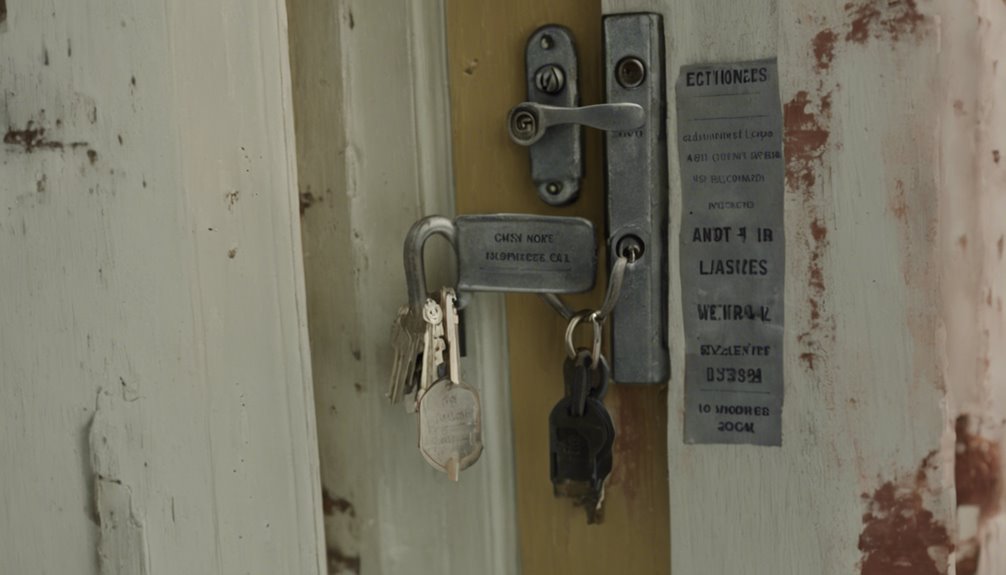
Failure to comply with rekeying laws in Illinois can lead to significant legal and financial repercussions for landlords. When you neglect to change locks or rekey after a tenant moves out, you expose yourself to liability for any theft or damages incurred by the subsequent tenant. If a theft occurs due to your failure to secure the property, you could face civil liability for the losses experienced, which may include financial setbacks and property damages. Tenants harmed in this way can pursue legal action for compensation.
Additionally, civil penalties may be imposed under the Illinois Human Rights Act, particularly if your oversight affects a service member's lease termination. These penalties aren't trivial and are calculated to enforce compliance with state laws. The amount of these fines can differ based on the circumstances but can be quite substantial. Furthermore, landlords in multi-unit dwellings are required by law to ensure lock changes for new tenants to enhance security. Practicing locksmithing in Illinois without authorization can also lead to serious consequences for landlords attempting to rectify security issues improperly. It is also important to note that unauthorized key duplication can lead to legal complications for landlords who may inadvertently infringe on tenant rights.
Legal consequences also come into play. If you're sued by a tenant for failing to comply with rekeying requirements, a court could find you negligent, resulting in unfavorable judgments against you. Such legal actions might compel you to implement corrective measures for future compliance.
Beyond financial and legal implications, your failure to rekey can irreparably damage the trust inherent in the landlord-tenant relationship. Tenants will feel insecure in their homes, leading to dissatisfaction and potential conflicts.
Ensuring compliance with rekeying laws is essential not only for legal reasons but also for fostering a positive, trustworthy relationship with your tenants.
Exemptions From Rekeying
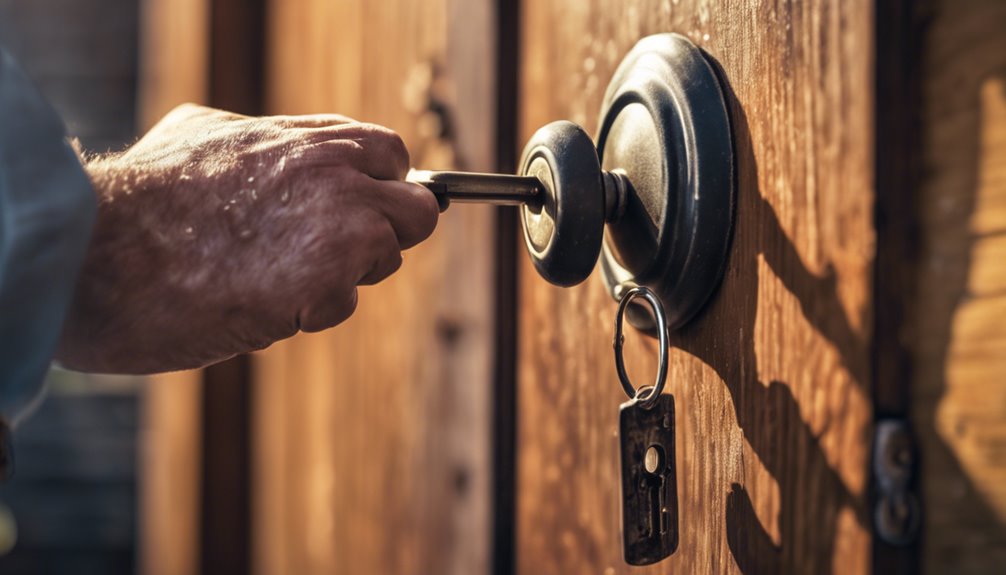
You need to understand the specific exemptions from rekeying that apply to owner-occupied properties and tenant lease agreements. Properties with four or fewer units are exempt from rekeying requirements, as are instances where lease agreements permit tenants to change locks independently. Furthermore, these exemptions can greatly impact your obligations as a landlord or tenant under Illinois law. It is crucial to recognize that landlord responsibilities include adhering to local ordinances, which may also provide guidelines on rekeying practices. Additionally, understanding the implications of license requirements for locksmiths could assist landlords in ensuring compliance when changing locks. Eviction processes often necessitate the involvement of a locksmith, particularly if a property needs to be secured after a tenant has vacated.
Owner-Occupied Properties Exemptions
While Illinois law sets forth specific requirements for rekeying locks, certain exemptions apply to owner-occupied properties, often providing relief for landlords managing smaller residential units.
Specifically, if you own a building with four or fewer units and occupy one of those units, you're exempt from the lock rekeying obligation. This exemption is vital for landlords operating in a more personal, manageable environment, as it allows them to maintain lock safety standards without excessive burden.
Similarly, if you're renting out rooms in your private residence and share the same living space with your tenant, you also qualify for this exemption. This arrangement nurtures a sense of community while respecting the privacy and security of both parties.
It's important to note that these exemptions pertain strictly to the size and occupancy of the building and don't extend to larger properties or situations where a new tenant has a written lease agreement, unless you meet the specific criteria. Additionally, employment laws can impact how landlords manage tenant relationships and their responsibilities regarding safety and security.
Additionally, in counties exceeding three million in population, stricter lock rekeying laws apply, negating any exemptions based on size.
Always refer to the Illinois Landlord and Tenant Act for precise regulatory guidance to guarantee compliance and avoid potential liabilities.
Tenant Lease Agreements Exemptions
When a lease agreement explicitly grants tenants the right to change or rekey the locks, landlords are exempt from the obligation to rekey the unit upon a tenant's departure. This exemption empowers you, the tenant, to manage lock changes independently, provided the lease states this right clearly and in writing. Additionally, ensuring that locks meet the commercial lock standards is crucial to maintaining security.
For the exemption to apply, your lease must specify that you can alter the locks after vacating, before a new tenant moves in. It's essential that these terms are documented; verbal agreements won't suffice. Your lease should clearly outline the responsibilities regarding lock changes to protect both you and the landlord.
Without this specific clause, landlords bear the responsibility of rekeying upon your exit. Additionally, if your lease includes a rekeying clause, the landlord isn't liable for theft or damages resulting from a failure to rekey.
The Illinois Landlord and Tenant Act provides this legal framework, ensuring security for tenants while limiting landlord liability when terms are properly established. Clarity in your lease can prevent future disputes and liabilities, granting you the freedom to manage your security effectively. Furthermore, ensuring compliance with ADA regulations can create a safer environment for all tenants, including those with disabilities.
Role of Locksmiths

Hiring professional locksmiths is essential for landlords aiming to comply with Illinois rekeying laws effectively and efficiently.
Their expertise provides cost-effective solutions, particularly when managing multiple units, while also mitigating potential legal liabilities.
Hiring Professional Locksmiths
A professional locksmith plays an essential role in guaranteeing legal compliance and security for landlords in Illinois. By hiring a licensed locksmith, you protect yourself from potential liabilities stemming from failure to adhere to the Illinois Landlord and Tenant Act.
Here are some key considerations for engaging a locksmith:
- Legal Compliance: They guarantee locks are changed or rekeyed precisely as mandated by law.
- Expertise: Licensed locksmiths possess the necessary training and skills to handle various locking systems effectively.
- Security Enhancement: They'll modify locking mechanisms to enhance security, guaranteeing old keys no longer function.
- Operational Efficiency: Professional locksmiths handle multiple units seamlessly, allowing you to focus on your property management tasks.
- State Regulation: Their licensing by the IDFPR guarantees adherence to stringent operational standards.
Employing a professional locksmith minimizes your risk of theft or damages due to negligence in lock changes, reinforcing both your legal standing and the safety of your properties.
Selecting the right locksmith can streamline your leasing process while guaranteeing compliance with state law.
Cost-Effective Solutions
Cost-effective solutions in rekeying can greatly benefit landlords aiming to maintain security while managing expenses.
Rekeying presents a substantially lower financial burden compared to purchasing and installing new lock systems. This method eliminates the need for new hardware and elaborate installation processes, allowing you to allocate resources elsewhere, especially when dealing with multiple rental units.
By retaining the existing lock hardware and only replacing the internal pins, you not only save money but also avoid disrupting the aesthetic appeal of your properties. This approach guarantees your doors maintain their original design while providing peak security levels.
In addition, rekeying is a quick process, typically completed within 10 to 15 minutes by an experienced locksmith, minimizing downtime for tenants moving in or daily activities.
Moreover, rekeying enhances security through customization. Each pin's unique arrangement renders previous keys useless, preventing unauthorized access.
Establishing a master key system offers both convenience and increased security, allowing only trusted individuals access to your property.
Ultimately, rekeying by a qualified locksmith gives you an affordable and efficient solution that safeguards your investment without compromising on style or security.
Ensuring Compliance Efficiently
Landlords must navigate the legal landscape regarding rekeying to guarantee compliance with Illinois laws, which impose significant responsibilities. Engaging a professional locksmith guarantees both adherence to regulations and security for new tenants.
Here's how locksmiths contribute to efficient compliance:
- They rekey locks to render old keys inactive, ensuring former tenants can't gain access.
- Locksmiths utilize advanced tools and techniques, minimizing the chance for error during the rekeying process.
- They can establish master key systems, providing controlled access for property managers.
- Many offer emergency services for urgent lock-related situations, reducing downtime between tenants.
- Regular lock maintenance services enhance overall safety and functionality of property entries.
Security and Liability

Security in rental properties is a paramount concern mandated by Illinois law, requiring that landlords change or rekey locks whenever there's a turnover in tenancy, particularly in densely populated counties. This measure protects new tenants, ensuring that prior occupants can't access their former residences with old keys. Under this law, landlords must either replace the locking mechanism or alter access methods, ensuring new keys don't correspond with former keys.
Failure to comply with these requirements exposes landlords to significant liability. If a theft occurs due to non-compliance, the landlord may be held financially responsible for damages incurred by the tenant. Ensuring the property's security is an obligation landlords must uphold to avoid legal penalties and potential financial repercussions. Any negligence in maintaining secure dwellings can lead to compensation claims from tenants for losses due to inadequate security measures.
In addition to safeguarding tenant interests, effective security measures can serve as a cost-efficient solution. For instance, rekeying often suffices when existing hardware is satisfactory. This simple process can enhance security while potentially streamlining lock management if uniform systems are utilized.
However, failure to enact these changes not only undermines the safety of tenants but also may result in legal actions taken against the landlord. Tenants have the right to secure environments, and Illinois law underscores landlord responsibility in upholding this.
Adopting proper security measures isn't merely legal compliance; it's a fundamental aspect of maintaining trust and protecting tenant freedom in rental agreements.
Lease Agreements and Communication

Effective communication between landlords and tenants is key to a successful rental experience, particularly when it comes to lease agreements. A well-drafted lease guarantees that both parties understand their rights and responsibilities, promoting harmony and reducing conflicts. In Illinois, while it's not mandatory to have a written lease for terms under a year, it's strongly recommended.
Here are some essential elements to take into account in lease agreements:
- Identify Parties Involved: Clearly name the landlord and tenant, including their addresses.
- Define Payment Terms: Outline rental payment schedules and stipulate any increase clauses.
- Security Deposits: Specify conditions for holding and returning security deposits.
- Rekeying Clause: Include provisions regarding lock changes after tenancy ends.
- Termination Notices: Clearly state notice periods for lease termination.
Without clear guidelines, misunderstandings may arise. For example, if the lease lacks a rekeying clause, the landlord is obligated to change the locks before new tenants move in. Hence, it's crucial that both parties communicate openly about their expectations.
Moreover, mandatory disclosures about lead-based paint or radon hazards should be presented upfront to promote safety and legal compliance.
As you navigate lease agreements, remember that good communication can foster a respectful relationship, facilitating a smoother tenancy and guaranteeing that all legal requirements are met. Your understanding of these capital points can protect your rights and enhance your rental experience.
Best Practices for Landlords and Tenants

While steering through the complexities of rental relationships, it's essential to adopt best practices that foster a constructive environment for both parties.
As a landlord, your obligations encompass timely lock changes upon a tenant's departure, particularly if your property is in a populous county. Guarantee compliance to avoid liabilities associated with theft or damage, and understand that exemptions exist for small, owner-occupied units.
For tenants, secure your rights by notifying landlords before altering locks and promptly requesting changes if you're a victim of domestic violence. Both parties should maintain transparent communication regarding security issues, guaranteeing that all requests are documented.
Adhere to the legal eviction process to protect your interests. Landlords, never change locks without a court order, and provide proper notices to tenants. In emergencies, have standard protocols for entering properties while still respecting tenant privacy.
Fostering a collaborative environment empowers both landlords and tenants. Confirm that maintenance responsibilities are defined and adhered to, as neglect can lead to unnecessary disputes.
Always seek legal guidance when maneuvering complex landlord-tenant interactions, especially regarding liability and compliance with local laws. Educating yourself on these regulations not only safeguards your freedom but also enhances your rental experience.
Frequently Asked Questions
How Often Should Landlords Rekey Locks Between Tenants?
You should rekey locks every time a tenant vacates the property. This essential step guarantees that the new tenant has exclusive access and protects their security.
Ignoring this requirement could expose you to liability for any theft or damages the new tenant experiences if unauthorized individuals have access to your property.
Prioritizing rekeying not only demonstrates your commitment to tenant safety but also safeguards you from potential legal repercussions or financial losses.
Can Tenants Request Rekeying After a Break-In?
Imagine your home as a fortress, and after a break-in, those walls feel compromised. You can request rekeying to restore your security.
While there's no specific law mandating this action, you can argue it's a reasonable measure to prevent future intrusions. Document the incident, as evidence strengthens your case.
Communicate your request to your landlord, emphasizing their duty to provide a safe living environment. Your safety matters, and taking action is essential.
What Types of Locks Can Be Rekeyed?
You can rekey various types of locks for enhanced security and control.
Mechanical locks, like deadbolts, require key replacement and can be set to operate with a single key across multiple locks.
Electronic and digital locks necessitate updating access codes or configurations, ensuring prior access is revoked.
Combination locks, both mechanical and electronic, can change combinations too.
Always verify that the new setup preserves safety while adhering to any applicable legal standards.
Are There Any Cost Estimates for Rekeying Services?
When you consider rekeying services, costs can range from $70 to $160 for a typical house.
Each lock usually costs about $30 to $70 to rekey, plus potential additional fees of $50 to $100 for the locksmith's travel.
Keep in mind that complex locks may incur higher charges.
How Can Tenants Verify if Locks Were Rekeyed?
To verify if locks were rekeyed, keep an eye out for new locks or changes in lock appearance.
You should inspect the functionality of the old keys and check for a written lease clause outlining rekeying responsibilities.
Communicate directly with your landlord for confirmation and request documentation, including dates and locksmith details.
If possible, be present during the rekeying to witness the process, ensuring all prior keys are deactivated.
Conclusion
In summary, understanding Illinois rekeying laws is essential for both landlords and tenants to maintain safety and compliance. Just like a key opening a door to a new home, rekeying symbolizes fresh beginnings and security. Failing to comply can leave you vulnerable, much like leaving a window open in a storm. By prioritizing lock changes and clear communication, you can foster trust and peace of mind, ensuring a secure living environment for everyone involved.

